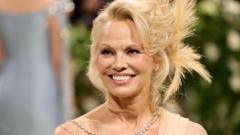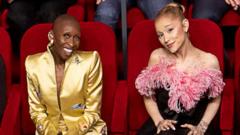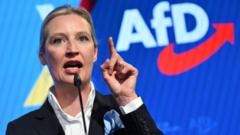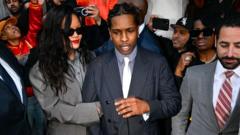Actress Blake Lively's recent legal filing has thrust the often-hidden world of hostile tactics and reputation management in Hollywood into the spotlight, raising questions about the authenticity of public opinion.
Blake Lively's Legal Battle Reveals Dark Side of Hollywood PR Tactics
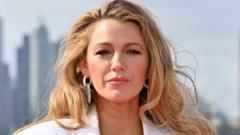
Blake Lively's Legal Battle Reveals Dark Side of Hollywood PR Tactics
In a shocking turn, Blake Lively's legal case unravels a network of 'hostile work environments' and smear campaigns in Hollywood public relations.
Blake Lively, once considered America’s sweetheart thanks to her roles in beloved series like Gossip Girl, is now at the center of a fierce legal battle that uncovers alleged 'hostile work environment' practices in Hollywood. The actress has filed a lawsuit against Justin Baldoni, her co-star and director on the film It Ends With Us, claiming he orchestrated a campaign to destroy her reputation after she raised concerns of sexual harassment.
In the summer, Lively was embroiled in controversy while promoting the film, as old interviews resurfaced and recontextualized her comments about domestic violence—an issue central to the narrative of the film. The backlash not only forced her into the public eye as a 'cancelled' figure but also, according to her lawsuit, served as a smokescreen for a more insidious retaliation plan led by Baldoni and his studio, Wayfarer.
Lively's legal team has described this retaliation as a "sophisticated, co-ordinated, and well-financed effort" involving a "weaponized digital army" that aimed to amplify false narratives about her. They claim this included fabrications fed to reporters by crisis communications professionals designed to manipulate public perception.
Despite these allegations, Baldoni's representatives have denied any wrongdoing, arguing that Lively's actions and public comments triggered the negative reactions from fans and media organically. They characterized her claims as "shameful" and lacking accuracy, alleging instead that Baldoni was driven to hire crisis management due to threats and demands from Lively herself.
As the case unfolds, Lively has garnered support from several Hollywood figures, notably Amber Heard, who compared the online vilification of women in the industry to the experiences she faced during her high-profile trials with Johnny Depp. This cross-industry support indicates a reckoning with the dark tactics sometimes employed to manipulate public opinion about women in entertainment.
Experts in public relations note that the tactics Lively claims are not uncommon in the industry, where negative stories about rivals can be planted to sway public sentiment. However, ethical boundaries often blur, especially in very public disputes—creating a murky landscape where truth is difficult to discern.
This unfolding saga has led to a broader conversation about the implications of 'cancel culture' and the power of social media in shaping narratives against individuals, particularly women. Commentators reflect on how easily public sentiment can shift when manipulated by behind-the-scenes PR maneuvers, with some fans expressing regret for having initially joined the fray against Lively.
With many now reassessing their stances on the actress, the question looms: What is the true narrative behind public perception, and can we ever fully trust what we read? The Lively case not only challenges individual reputations but also calls into question the very fabric of media authenticity in Hollywood.







